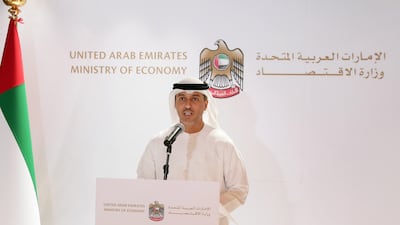The UAE expects a 20 per cent increase in the number of patent applications in 2022, aided by a new industrial property law that aims to attract more foreign investments to priority sectors and making it easier for start-ups to operate.
The Ministry of Economy received 2,428 patent applications last year, up from 1,917 requests in 2020, mainly within sectors including machinery, construction, chemical engineering, pharmaceuticals and biotechnology, electricity, metals and information and communication technology, the ministry said in a media briefing on Tuesday.
The total number of patent applications tripled over the past decade to reach 24,511 in 2020, up from 8,028 in 2010.
This new law forms a part of extensive legal reforms announced last November.
The UAE will reach its growth goals by "accelerating the transformation towards a new, more flexible and sustainable knowledge-based economic model that keeps pace with the latest economic trends in which innovation, technology, research and development, national competencies, investors, talent and entrepreneurs are the key drivers of progress", said Ahmad Al Falasi, Minister of State for Entrepreneurship and SMEs.
The number of patent filings is one of the metrics used to gauge the level of innovation in a country, according to the World Intellectual Property Organisation (Wipo). The UAE – the Arab world’s second-largest economy – climbed one spot in Wipo's Global Innovation Index 2021 to rank 33rd out of 132 countries.
The country ranked 32nd among the 51 high-income group economies and third among the 19 economies in Northern Africa and Western Asia.
Wipo placed the UAE at the top spot among Arab nations for the sixth consecutive year, citing its infrastructure, business sophistication, human capital and research and market sophistication.
The UAE's new industrial property and patents law is expected to particularly benefit individual investors, universities or academic institutions that oversee the development of inventions by their students, companies with inventions or R&D centres, innovative entrepreneurs, small and medium businesses and start-ups, the information and technology sector, and tech companies.
The Ministry of Economy reduced the direct cost of applying for patents from Dh7,500 to Dh1,000 for students, Dh3,500 for entrepreneurs and Dh5,000 for large companies, making it a more accessible, cheaper and faster process for a range of applicants, Mr Al Falasi said.
The new legislation introduces fundamental amendments to the previous industrial property law No. 31 of 2006 to improve the intellectual property and patent environment in the country, he said.
Through the new law, the ministry aims to reduce the time taken for patent examinations to six months, from 42 months previously, in line with best practices followed by global patent offices in Japan, South Korea, US, China and EU.
The new law now protects industrial property rights by adding rights that were not included in the previous legislation. These are the protection of integrated circuit layout designs and the protection of undisclosed information that will encourage research in industrial and commercial areas.
The new law will also add several new procedures for flexibility in managing and examining applications.
Firstly, this includes a fast-track for patent applications that require swift actions and secondly, converting patent applications to utility certificates and vice versa. Thirdly, it will be possible to divide patent applications, utility certificates and industrial design into several filings to allow protection of the invention in the various stages of its development, the ministry said.
Overall, the new law will create a more competitive and stimulating environment for investment in areas related to innovation and invention, and support the country's industrial development goals, Mr Al Falasi said. It will also increase the UAE's attractiveness as a destination for innovative companies and improve the country's ranking in relevant indicators such as the Global Innovation Index.
In 2014, the UAE introduced its National Innovation Strategy with the aim of making the country one of the world’s most innovative within seven years. The strategy identifies education, health care, technology, transportation, renewable energy, space and water as the main priority sectors.


